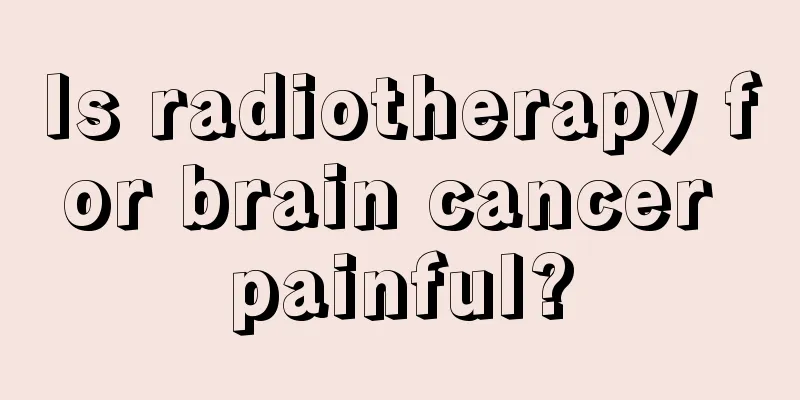How long can you live with a pituitary tumor

|
Recently, a friend who has a pituitary tumor always has trouble eating and sleeping. He kept asking me how long he can live with a pituitary tumor. I think the length of survival time of a person with a pituitary tumor is related to many factors, including treatment factors, psychological factors, etc. Let's talk specifically about the question of how long you can live with a pituitary tumor. Long-term survival can be achieved after scientific and reasonable treatment. The survival period of patients with pituitary tumors should be judged based on the severity of the patient's pituitary tumor symptoms, the success rate of surgical tumor resection, postoperative treatment and other aspects. Everyone is different, so an accurate answer cannot be given. Treatment of pituitary tumors. The current treatment method for pituitary tumors is comprehensive treatment, including surgical treatment, radiotherapy, and chemotherapy. According to the different needs of patients, a personalized treatment plan is formulated. Ultimately, the patient's tumor can be removed, and during lifelong follow-up, the recurrence of the tumor can be avoided, the patient's pituitary function can be preserved as much as possible, the elevated secretion of hormones can be reduced to the normal range, and the reduced pituitary hormones can be replaced to the normal range matching the age, thereby improving the patient's quality of life and prolonging the patient's life. Pituitary tumors are a group of tumors that arise from the anterior and posterior pituitary and residual cells of the craniopharyngeal epithelium. About 10% of intracranial tumors have obvious clinical symptoms. Males are slightly more likely to have pituitary tumors than females. Pituitary tumors usually occur in young and middle-aged people, often affecting the patient's growth and development, reproductive function, learning and work ability. Clinical manifestations include abnormal hormone secretion syndrome, tumor compression of the surrounding pituitary tissue syndrome, pituitary apoplexy and other manifestations of anterior pituitary hypofunction. Clinical manifestations 1. Hormone secretion abnormalities: Hormone secretion excess, such as acromegaly caused by excessive growth hormone; Hormone secretion deficiency. When non-functional tumors grow and normal pituitary tissue is damaged, amenorrhea occurs due to decreased gonadotropin secretion. Infertility or impotence often occurs first and is more common. 2. Tumor compression of the pituitary surrounding tissues (1) Nerve fiber irritation syndrome presents as persistent headache. (2) Compression of the optic nerve, chiasm and optic nerve bundles causes vision loss, visual field defects and fundus changes; other compression syndromes. 3. Pituitary stroke. 4. Other manifestations of anterior pituitary hypofunction. Regarding the treatment of pituitary tumors: 1. Comprehensive treatment The treatment of pituitary tumors mainly includes surgery, drugs and radiotherapy. Because there is no method that can achieve the goal of complete cure, various treatment methods have their own advantages and disadvantages. An individualized treatment plan should be formulated based on the size of the patient's pituitary tumor, hormone secretion, complications and comorbidities, the patient's age, whether there is a desire to have children, and the patient's financial situation. The treatment of pituitary tumors is a comprehensive treatment process involving multiple departments. 2. Radiotherapy: Since pituitary tumors are adenomas, they have poor sensitivity to radiotherapy. After radiotherapy, 70% to 80% of patients experience decreased pituitary function, which reduces their quality of life. Therefore, radiotherapy is only suitable for patients with surgical residuals, cannot tolerate surgery, are insensitive to drugs, or have comorbidities that prevent them from undergoing surgery or drug treatment. 3. Drug treatment For pituitary prolactin-secreting tumors, more than 90% of patients (whether microadenomas or macroadenomas) can use dopamine agonists (short-acting preparations of bromocriptine, long-acting preparations of cabergoline) to control PRL levels and reduce the size of the tumor. Only those prolactinoma patients who are allergic or intolerant to such drugs, who have acute symptoms caused by tumor compression and need emergency surgery to relieve pressure, or who are unwilling to undergo surgical treatment, choose surgical treatment. During the treatment with bromocriptine, the dose of bromocriptine should be gradually increased until the serum PRL level drops to normal levels, and then the dose should be adjusted for long-term maintenance treatment. 4. Surgical treatment Currently, surgery is the main treatment for pituitary tumors, supplemented by drug therapy and radiotherapy. Pituitary tumors are located in the sellar region, surrounded by important neural structures such as the optic nerve, internal carotid artery, and hypothalamus, so surgery still has certain risks. Current surgical methods include transsphenoidal, craniotomy, and gamma knife. Tumors with a diameter greater than 3 cm that are adhered to the optic nerve or impair vision can be treated surgically first. The surgery must achieve sufficient decompression of the optic nerve, and then gamma knife treatment can be performed after surgery. However, recurrence is still possible after surgery, so regular follow-up is required. |
<<: Should people with bile duct cancer exercise?
>>: Can I run more if I have bile duct cancer?
Recommend
What is the treatment plan for advanced laryngeal cancer
Laryngeal cancer usually requires reasonable trea...
What are the methods of self-protection and self-rescue?
Nowadays, there are more and more accidents, espec...
Is it normal to have two bowel movements a day?
Most people have bowel movements once a day, and ...
The nail of the index finger is uneven, and it turns out that you have these diseases
Many people don’t know that nails are an excellen...
What's wrong with sore throat and neck?
The vocal part of the human throat is called the ...
What are the precautions for sweat steaming
Nowadays, with the continuous improvement of livi...
Will I have hyperlipidemia after thyroid cancer surgery?
Hyperlipidemia may occur after thyroid cancer sur...
What are the causes of brain cancer?
The main causes of brain cancer are genetic, chem...
What are the steps for applying nail polish?
Nail polish is a common manicure tool, and there ...
What causes back pain? Pay attention to back pain
Have you ever experienced back pain? In many case...
What is the best way to treat meningitis?
Meningitis often occurs in children and the elder...
Analysis of the three main breast cancer treatment methods
Breast cancer is a tumor disease that may lead to...
Why do I feel itchy all over when running
In daily life, many people will feel itchy all ov...
Active Dry Yeast
Active dry yeast is quite common in our daily lif...
What useful substances can the prostate secrete
Some substances are necessary for our body, but s...









